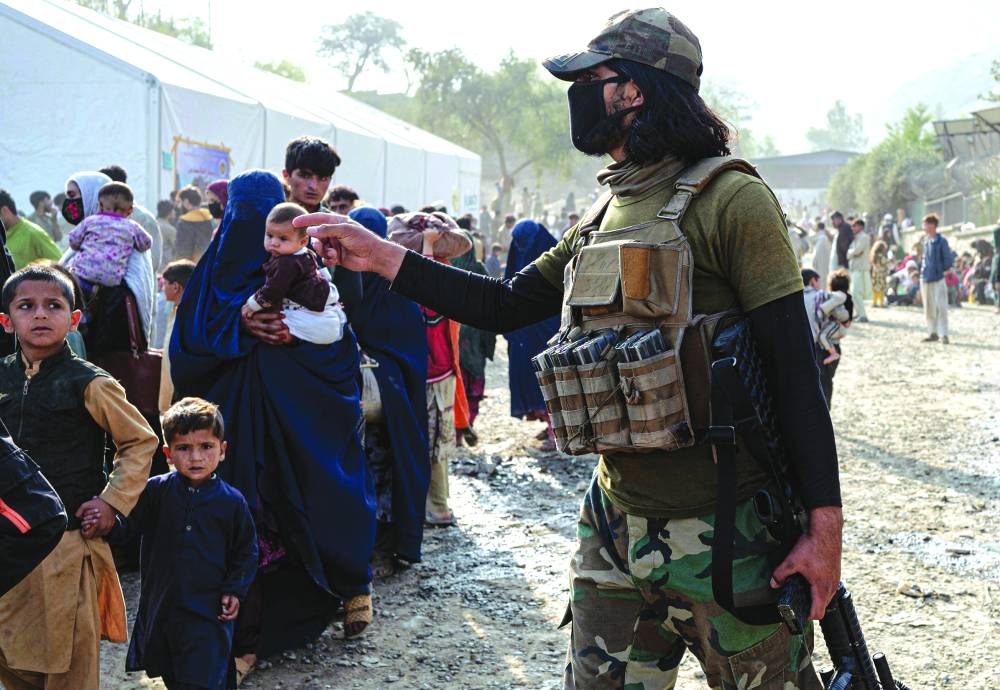Thousands of people swamped Pakistan’s main northwestern border crossing seeking to cross into Afghanistan yesterday, a day after the government’s deadline expired for undocumented foreigners to leave or face expulsion.
Pakistani authorities began rounding up undocumented foreigners, most of them Afghans, hours before Wednesday’s deadline.
More than 1mn Afghans have to leave or face arrest and forcible expulsion as a result of the ultimatum delivered by the Pakistan government a month ago.
Scrambling to cope with the sudden influx, the Taliban-run administration in Afghanistan said temporary transit camps had been set up, and food and medical assistance would be provided, but relief agencies reported dire conditions across the border.
“The organisations’ teams stationed in the areas where people are returning from Pakistan have reported chaotic and desperate scenes among those who have returned,” the Norwegian Refugee Council, Danish Refugee Council and International Rescue Committee said in a joint statement.
The Pakistani government has brushed off calls from the United Nations, rights groups and Western embassies to reconsider its expulsion plan, saying that Afghans had been involved in militant attacks and in crime that undermined the security of the country.
More than 24,000 Afghans crossed the northwestern Torkham crossing into Afghanistan on Wednesday alone, Deputy Commissioner Khyber Tribal District Abdul Nasir Khan said. “There were a large number waiting for clearance and we made extra arrangements to better facilitate the clearance process.”
Authorities had worked well into the night at a camp set up near the crossing, he added.
The border, at the northwestern end of the Khyber Pass on the road between Peshawar in Pakistan and Jalalabad in Afghanistan, is usually closed by sundown.
Khan said that 128,000 Afghans had exited through the crossing since the Pakistani government issued its directive.
Others were crossing the border at Chaman, in Pakistan’s southwestern province of Balochistan.
Major roads leading to border crossings were jammed with trucks carrying families and whatever belongings they could carry.
Aid agencies estimated the number of arrivals at Torkham had risen from 300 people a day to 9,000-10,000 since last month’s expulsion decree.
Some Afghans who have been ordered to leave have spent decades in Pakistan, while some have never even been to Afghanistan, and wonder how they can start a new life there.
Of the more than 4mn Afghans living in Pakistan, the government estimates 1.7mn are undocumented.
Many fled during the decades of armed conflict that Afghanistan suffered since the late 1970s, while the Taliban’s takeover after the withdrawal of US-led coalition forces in 2021 led to another exodus.
Aid agencies warned that the mass movement of people could tip Afghanistan into yet another crisis and expressed “grave concerns” about the survival and reintegration of the returnees, particularly with the onset of winter.
International humanitarian funding for Afghanistan dried up after the Taliban took over and imposed restrictions on women.
More than 1,500 undocumented Afghans were being brought to the southwestern Chaman crossing after being rounded up in police raids in different areas of Pakistan, including the major port Karachi, Balochistan Information Minister Jan Achakzai said.
People crossing from Chaman into Afghanistan’s Spin Boldak have run into trouble finding transport to their final destinations, said Ismatullah, a bus service operator.
“A huge number of people are coming from Karachi but face a shortage of buses and trucks,” he told Reuters by phone from Spin Boldak. “Obviously in such situations the fares have increased. The (Afghan) government is helping people according to its ability, but it is not enough.”
“We are constantly in contact with them (Pakistani authorities) asking for more time. People must be allowed to return with dignity,” the Taliban government’s refugees minister Khalil Haqqani told AFP. “They should not give Afghans a hard time, they should not make more enemies.”

An Afghan security officer gestures as refugees arriving from Pakistan walk at the Afghanistan-Pakistan Torkham border in Nangarhar province.
